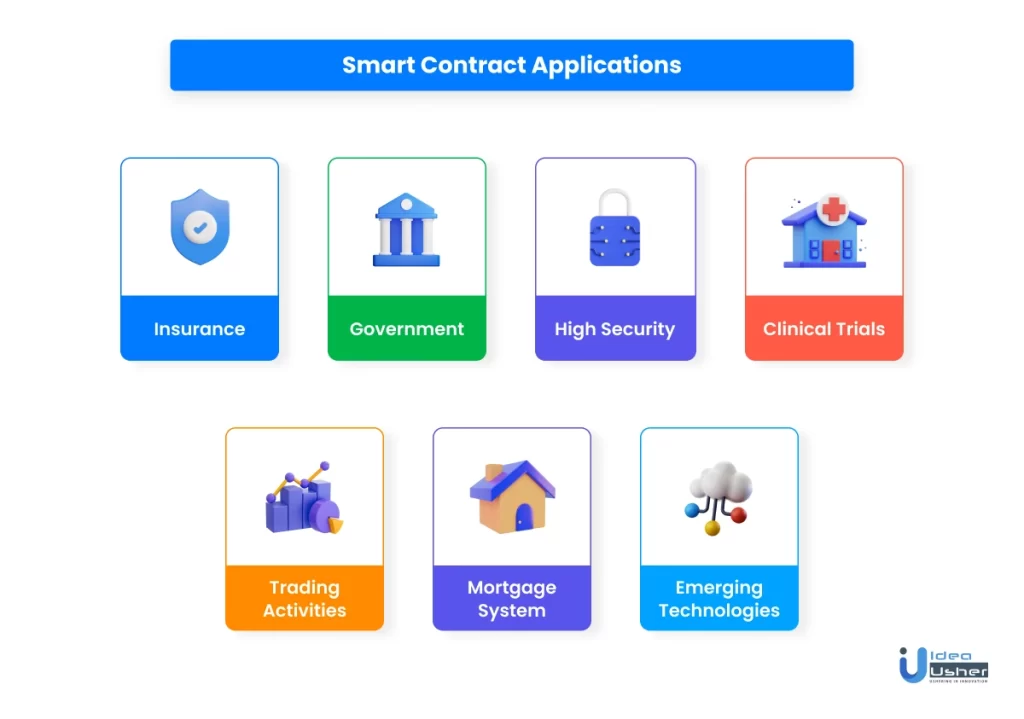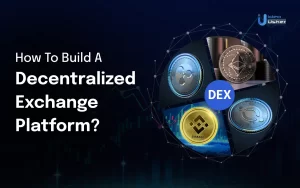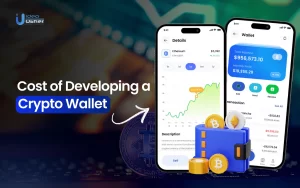What are smart contracts?
They are blockchain-based programs that execute on the ethereum blockchain. This means it’s a direct contract between buyer and seller without the need for an intermediary or delay. They can also automate a process to take the following actions when circumstances are satisfied.
In short, a decentralized network like a blockchain uses smart contracts for self-executing business automation solutions.
The smart contracts market size was valued at USD 149.5 million in 2021 and is expected to reach USD 820.62 million by 2030, increasing at a CAGR of 26.40 percent from 2022 to 2030.
Verified Market Research
In this blog, we will learn how smart contract use cases are changing the world around us and the benefits of smart contracts that will encourage and expand the market in the future.
How do Smart Contracts Work?
- First, smart contracts execute “if/when…then…” phrases encoded into blockchain code. When predefined circumstances are satisfied and validated, a network of computers does all the necessary tasks. These can entail issuing tickets, registering a vehicle, sending notices, or distributing payments to the appropriate parties.
- Second, after the transaction gets completed, the blockchain is updated. It implies that the transaction is irreversible and that the only individuals permitted to see the results are those who are authorized. There might be as many conditions required in a smart contract to reassure the parties that the work will get finished successfully.
- Third, participants must decide how transactions and their data should get recorded on the blockchain, agree on the “if/when…then…” rules, consider potential exceptions, and design a framework for resolving disputes to set the terms.
- A developer can then create the smart contract, while increasingly, businesses using blockchain for business offer templates, web interfaces, and other online tools to simplify smart contract construction.
How do Ethereum Smart Contracts Work?
- Smart Contracts are tools that can assist with the execution of transaction automation. These contracts integrate with Ethereum, a blockchain designed to work with such contracts independently.
- When an individual wants to sell a house, they would require a middleman, a broker. The broker would take a percentage of the total amount to begin the process and be the intermediate between both. Let’s illustrate where we remove the intermediaries like brokers and create a smart contract.
- This setup (smart contract) will sell the house to the buyer, transfer the rights, and give the seller the money once a sum more than a specific value is given for the property.
- Now, the process continues without the broker, eliminating middle parties and directly between buyer and seller, making it cheaper and more secure.
- Since smart contracts are recorded on Ethereum, they inherit specific qualities. Two features stand out: immutability and worldwide distributability. Due to its immutability, no one can tamper with a smart contract once deployed.
- Furthermore, worldwide distributability implies that everyone on the ethereum network validates the output of the contract. It is nearly hard to tamper with the contract because if someone tries to change it, other users on the network will declare it invalid.
Hundreds of smart contract-enabled apps are already running. MakerDAO and Compound are two popular Ethereum apps that allow users to lend money and earn interest.
What Purposes Do Smart Contracts Serve?
Smart contracts provide countless opportunities. They are used for trading activities, insurance, clinical trials, and high security.

Let’s examine how smart contracts are helpful to some businesses and how they will benefit others.
1. Insurance
One of the most common applications for such contracts is insurance. The majority of disagreements occur in the insurance industry.
Let’s use vehicle insurance as an illustration. Smart contracts are used to pay the insurance quickly.
These contracts must use various technologies, including the Internet of Things, to do this.
The smart contract will streamline the policy and ensure that it has all the necessary documents, such as driver reports and driving histories.
It can execute itself immediately after the accident if the smart contract has the appropriate policy, documentation, and data collection methods. Furthermore, these contracts are implemented based on the data gathered, preventing fraud from occurring throughout the process.
In 2017, Atlas Insurance and Axa were two insurance companies that tested smart contracts.
2. Government
Smart contracts facilitate automation and can assist the government in managing activities. The government can utilize one of these operations—land title recording—to transfer property.
Parties must transfer property efficiently and quickly in order to comply with land title recording requirements. A smart contract might facilitate this. Utilizing it will help lower auditing expenses and increase system transparency.
Other uses for government include electronic elections, digital identification, and electronic record-keeping.
3. High Security
Securities are another real-world smart contract use case. Capitalization table management may be streamlined and enhanced with smart contracts, indicating that no third parties, such as security custody chains, are in the middle. Also, it can be used for stock splits, dividends, automated payments, and liability management.
Additionally, smart contracts can assist in digitizing procedures and lowering operational risk.
4. Clinical Trials
Smart contracts can help enhance clinical studies by increasing institutional awareness. Due to its ability to automate calculations while maintaining privacy, it can also automate data transfer across organizations.
Additionally, they may automate trials and distribute data across industries. Also, it can assist in the identity, authorization, and authentication of data.
5. Trading Activities
Expensive and dangerous settlement procedures hamper today’s transaction efficiency. In short, the purchasing party will always be in danger of fraud since it can never be sure that the selling party will maintain its end of the deal.
Workflows for trade authorization now consist of various expensive and time-consuming sequential procedures. Leveraged loans, for instance, may have a settlement time of up to 20 days.
Due to difficulties with liquidity, this feature alone makes the leveraged loan market extremely undesirable. Additionally, utilizing several IT systems leads to inconsistencies and prolongs the settlement process.
Smart contract technology is an important component of trade finance because it dramatically reduces related risks by delaying transaction execution until specified settlement conditions are satisfied.
Smart contracts may automatically carry out the bulk of paperwork, KYC, and AML processes. It significantly lowers a wide range of operating expenses, shortens settlement times, and increases the liquidity of specific markets.
6. Mortgage System
Mortgage financing continues to rely on outdated frameworks primarily. Bank personnel and other stakeholders review a bunch of financial papers, manually emailing them to authorize loans. This method is time-consuming and susceptible to human error because each document must be signed to be recorded.
With the help of smart contracts, the entire procedure may be digitized and largely automated. The digital versions of the papers will be available to everyone concerned, and payments will also finish instantly after obtaining electronic signatures.
7. Emerging Technologies
One of the most intriguing uses of blockchain and integrated smart contracts is the ability to simplify complex computational operations like those involved in machine learning and artificial intelligence.
There is a possibility to develop AI-powered smart contracts by fusing the data-intensive processing of AI with the immutability and decentralized security of blockchain technology.
Further, applications for smart contracts will need to advance in complexity to fulfill their new functions as a variety of sectors adopt them. Smart contract use cases can be created manually. However, AI-enabled contracts can make it possible to develop far more advanced, responsive, and enterprise-grade dApps, thus significantly enhancing the technology’s potential.
According to several experts, the distinguishing traits of blockchain and AI might complement each other. Smart contracts can take advantage of AI technology’s computational power and adaptive systems. Moreover, AI implementations can use smart contract technology to execute sets of rules autonomously for storing sensitive and priceless machine learning data.
Benefits of Smart Contracts
Using smart contracts has several advantages, a few of which are listed below.
1. Speed, Efficiency, and Accuracy
The contract is instantly executed once a condition is satisfied. Since smart contracts are digital and automated, there is no paperwork to complete or time required to correct errors that sometimes arise when manually filling out forms.
2. Autonomy and Savings
Since brokers or other intermediaries are not required to confirm an agreement under a smart contract, there is no possibility of other parties manipulating the deal. Additionally, smart contracts save money because there is no mediator involved.
3. Security
Since the blockchain transaction records are encrypted, they are complicated to hack. Additionally, because each record on a distributed ledger is linked to the entries before and after, hackers would need to change the entire chain to change a single document.
4. Backup
In case of any data loss, an individual can recover original documents saved on the blockchain as they are all duplicated.
Conclusion
The smart contract represents a revolutionary opportunity for many industries. Several decades-old business relationships’ stumbling blocks are highlighted as smart contracts gain traction.
As a result, the essential but time-consuming and protracted process of reevaluating and changing the present administrative systems is facilitated. We encourage blockchain enthusiasts, technology observers, small and medium-sized businesses, and major corporations to keep investigating and experimenting with smart contracts.
Smart contracts are highly complicated software applications that hold and manage vast assets. Developers should utilize tools to check these contracts and look for exploitable flaws before publishing them.
We, at Idea Usher, aim to produce Ethereum applications built to safeguard users. Here, we release apps integrating our industry-leading collection of blockchain security research tools with a hands-on assessment by our experienced, smart contract auditors.
Contact us to boost your business with smart contracts.
E-mail: [email protected]
Phone Numbers : (+91) 946 340 7140, (+91) 859 140 7140 and (+1) 732 962 4560
Build Better Solutions With Idea Usher
Professionals
Projects
Frequently Asked Questions
Here are a few exciting questions about smart contracts.
1. Where do smart contracts get used?
Smart contracts can be used in real estate, healthcare, gambling, and even the configuration of whole company organizations.
2. Is smart contract the future?
Smart contracts already exist; they are used in business deals with specialized firms currently active in the bitcoin or blockchain industries. They will soon become much more prevalent as more people realize and have confidence in blockchain technology.
3. How do smart contracts make money?
A decentralized exchange makes a profit without needing a central authority using a collection of smart contracts. In the transactions, no banks or payment processors are involved. As a result, the users can exchange cryptocurrencies, borrow or lend money, and earn interest, all without using an intermediary.
4. Which crypto has smart contracts?
Currently, the most well-known smart contract platform is Ethereum. However, several other cryptocurrency blockchains, including EOS, Neo, Tezos, Tron, Polkadot, and Algorand, are also capable of supporting them.

























